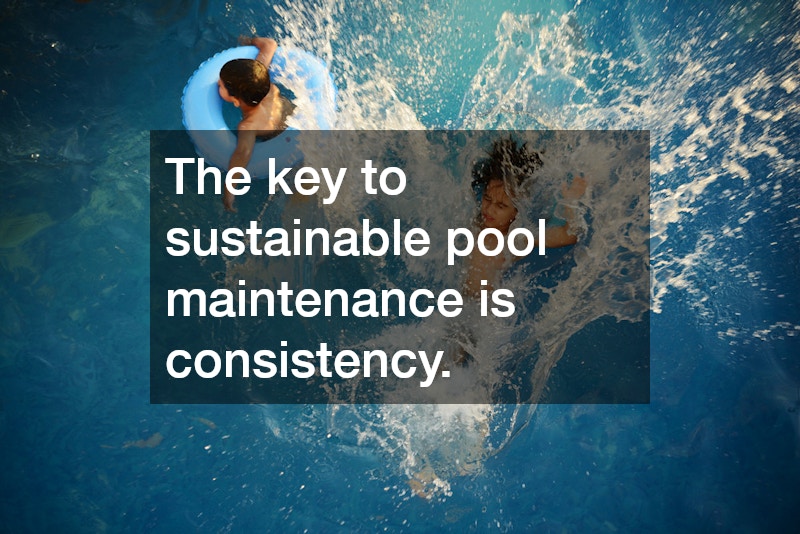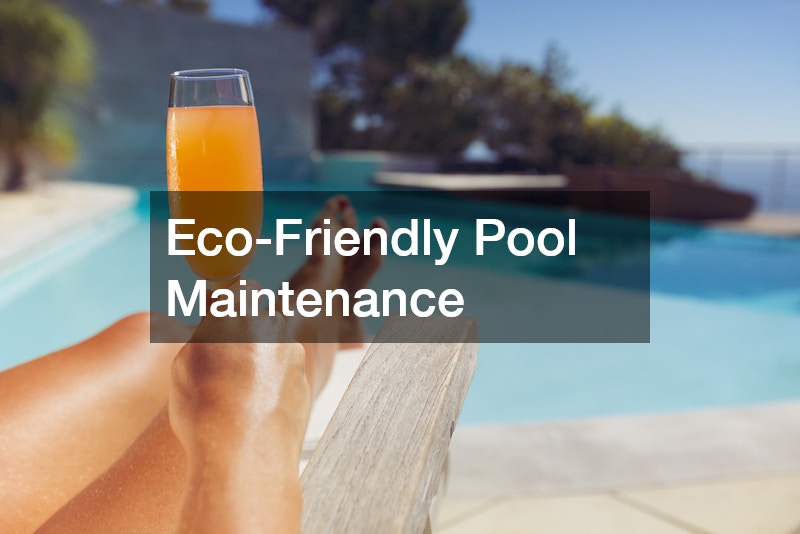Pool maintenance doesn’t have to come at the cost of the environment. Taking an eco-friendly approach to maintaining your pool can help you save money, protect your family’s health and reduce your impact on the planet.
For many Australians, a backyard pool is a source of joy, especially during the warmer months. However, traditional pool maintenance methods often rely on harsh chemicals and excessive water use. By adopting more sustainable habits and products, you can enjoy a clean and safe pool while doing your part for the environment.
Rethink Your Pool Chemicals
Traditional chlorine-based chemicals can be effective, but they also pose risks to human health and the environment. Chlorine produces by-products like chloramines, which can cause skin irritation and respiratory issues. Over time, these chemicals can also seep into the ground or evaporate into the air, contributing to pollution.
Switching to alternative sanitation methods is one of the best ways to reduce your pool’s environmental footprint. Saltwater systems are a popular choice, using electrolysis to convert salt into chlorine at lower, more stable levels. Other options include mineral-based sanitisers, UV filtration or ozone systems, which reduce the need for chemicals altogether.
It’s important to monitor water quality regularly. By testing the pH, chlorine levels and alkalinity weekly, you can maintain a healthy balance and avoid overusing chemicals. Eco-friendly pool maintenance relies on prevention and balance, rather than quick chemical fixes.
Invest in a Pool Cover
One of the simplest ways to save water and energy is by using a pool cover. In Australia’s hot and dry climate, pools lose large volumes of water through evaporation. A well-fitted cover can reduce evaporation by up to 95%, conserving thousands of litres each year.
Pool covers also help maintain the water temperature, reducing the need for heating. If you use a solar heater or heat pump, you’ll need less energy to keep the pool warm. Covers also keep out leaves and debris, making pool maintenance easier and reducing the need for frequent cleaning or chemical adjustments.
There are many types of covers to choose from, including manual, automatic and solar covers. The initial investment is often offset by long-term savings in water, energy and time.
Switch to Energy-Efficient Equipment
Traditional pool pumps and filters can consume a lot of electricity. Upgrading to energy-efficient equipment can reduce your power bills and environmental impact.
Variable-speed pool pumps are a smart alternative to single-speed models. They adjust their speed based on the task, using less power for everyday circulation. These pumps are quieter, longer-lasting and can cut energy use by up to 80%.
Filters also matter. Cartridge filters use less water for cleaning than sand filters and don’t require backwashing. They’re ideal for eco-conscious pool owners looking to minimise water waste.
If you use a pool heater, consider solar options. Solar pool heating systems use energy from the sun to warm your water, offering a low-cost and sustainable alternative to gas or electric heaters.
Choose Eco-Friendly Cleaning Methods
Keeping your pool clean doesn’t have to involve harsh chemicals or power-hungry equipment. Manual cleaning tools such as skimmers and brushes are effective and use no electricity. Robotic pool cleaners are another great choice — they operate independently and are more energy-efficient than traditional suction or pressure cleaners.
Regular cleaning not only improves water quality but also reduces the need for chemical treatments. Removing debris before it decays helps prevent algae growth and keeps your filtration system running smoothly.
Natural pool cleaning solutions are also worth considering. Baking soda can help manage pH levels, and white vinegar can be used to clean tiles and surfaces without toxic residues.
Conserve Water Wherever Possible
Pools require a lot of water, but there are ways to minimise waste. Alongside using a pool cover, monitor your water levels and fix leaks promptly. Even a small leak can waste thousands of litres over time.
If you need to drain and refill the pool, do so sparingly and only when necessary. Backwashing the filter less frequently, and only when the pressure indicates it’s needed, also helps conserve water.
Collecting rainwater for top-ups is another environmentally friendly practice. You can install a rainwater tank and use this free resource to help maintain your pool’s water level.
Maintain Your Pool the Smart Way
The key to sustainable pool maintenance is consistency. Keeping a regular schedule for testing, cleaning and equipment checks ensures your pool stays in top condition without needing drastic interventions.
Creating a maintenance calendar can help you stay on track and avoid overusing chemicals or unnecessary water consumption. Simple habits like brushing the pool walls, skimming daily and running the pump during off-peak hours can all contribute to a more sustainable system.
Educate household members about the importance of eco-friendly habits around the pool. From rinsing off before swimming to covering the pool at night, small actions make a big difference.
Eco-friendly pool maintenance is not only possible — it’s practical and rewarding. With the right approach, you can reduce your environmental impact, save money and keep your pool clean and safe for everyone to enjoy.
By rethinking your chemicals, upgrading equipment and adopting water-saving practices, you’ll be making a long-term investment in your pool and the planet. A bit of effort today means a healthier, more sustainable tomorrow for you and your family.
So take the plunge — make your pool maintenance green, efficient and guilt-free.



